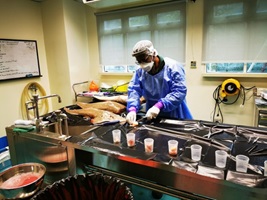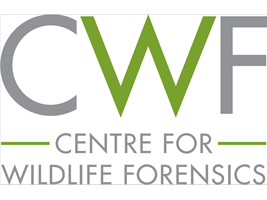Centre for Wildlife Forensics
Centre for Wildlife Forensics
Illegal wildlife trade threatens the survival of endangered species, destroys biodiversity, and disrupts ecosystems.
Singapore is a Party to the Convention on International Trade in Endangered Species of Wild Fauna and Flora (CITES). This convention ensures that the international trade in wildlife is carried out in a way that does not threaten their survival. In this regard, Singapore has put in place a whole-of-government approach to combat the illegal trade in CITES-listed species. This approach is anchored by a strong legal and effective enforcement framework across the government.



Singapore's first Centre for Wildlife Forensics
The Centre for Wildlife Forensics (CWF) is Singapore’s first national facility for wildlife forensics. It leverages on science and technology to investigate cases of illegal wildlife trade. Such use of forensic science will help to identify and verify species and produce evidence that supports law enforcement and prosecution.
It also enables NParks to build in-house capabilities for wildlife forensic investigations, such as the identification of wood specimens and DNA testing of animal specimens. This will support Singapore’s implementation and enforcement of our CITES commitments.
The centre draws on expertise from various NParks resources and personnel, as well as partnerships with regional and international experts on wildlife forensics analysis and enable us to contribute to the global fight against illegal wildlife trade.
WOAH Collaborating Centre for Wildlife Trade and Wildlife Health
The World Organisation for Animal Health (WOAH) Collaborating Centre (CC) for Wildlife Trade and Wildlife Health, hosted by the CWF under NParks, specialises in promoting safe and sustainable wildlife trade while protecting biodiversity and wildlife health in the Asia-Pacific region. As the world’s first CC on Wildlife Trade and Wildlife Health, the Centre focuses on managing threats to wildlife health such as illegal wildlife trade and transboundary disease risks, especially through forensics capabilities. The Centre champions a One Health approach to wildlife trade regulation, biodiversity conservation, and the management of human–wildlife–ecosystem interfaces. Its work encompasses wildlife forensics, biosurveillance, capacity building in regulatory frameworks, and research on species identification and provenance as well as advanced pathogen detection and genomic analyses in diseases of high-risk wildlife species involved in both legal and illegal trade.
The Centre’s specialties include:
Wildlife trade regulation and forensics
- Application of wildlife forensics capabilities for combatting illegal wildlife trade.
- Capacity building for implementation of biosecurity and sanitary regulations.
- Development of harmonised guidelines for wildlife trade.
- Outreach and building multi-stakeholder networks in wildlife trade regulation with respect to disease and conservation.
A scientific approach to safeguarding regional wildlife health, biodiversity and conservation
- Development of expertise in regional cross-border disease risks, biosurveillance, response and mitigation.
- Capacity building in biodiversity, wildlife management and conservation frameworks within an urban context.
- Using Singapore’s existing One Health governance and collaboration framework to engage the regional One Health network on wildlife health and biodiversity conservation efforts.
The CC for Wildlife Trade and Wildlife Health is expected to serve as a regional centre of excellence for wildlife health that advances WOAH’s strategic objectives in the Asia-Pacific region. Through its multi-disciplinary expertise and networks, the Centre will drive initiatives in three key areas:
- Promoting sustainable and legal wildlife trade with robust health safeguards.
- Enhancing regional wildlife health and biodiversity conservation through scientific research and capability building.
- Strengthening regional partnerships for collaborative protection of wildlife health.
3 Key Pillars
CWF comprises three key pillars:
- Fauna identification and analysis
- Flora identification and analysis
- Molecular diagnostics and analysis
International Panel of Advisors
The Centre has established an International Panel of Advisors who will guide and provide strategic advice to NParks to develop capabilities and research areas that are in line with international standards.
The members of the Panel are:
- Dr Lee Fook Kay, Chief Scientist, Ministry of Home Affairs Singapore
- Dr Peter E Gasson, Research Leader, Royal Botanic Gardens, Kew
- Dr Ed Espinoza, Laboratory Deputy Director, US Fish and Wildlife Services Forensics Laboratory
- Dr Samuel K Wasser, Research Professor, Department of Biology and Director of the Center for Conservation Biology, University of Washington
How can you be involved?
- Do not consume or purchase illegal wildlife products, especially when overseas.
- If you are buying CITES endangered species parts and products, please ensure that the shop has a valid CITES permit, and for the shop to handover the CITES permit to you when you purchase it.
- The demand for wildlife products drives supply and fuels the illegal wildlife trade. Responsible consumption will reduce the demand for endangered species.
- If you spot any occurrences of illegal wildlife trade, or ownership of endangered or wild species and their parts, you may contact NParks using the online feedback form or call 1800-476-1600. Information shared will be kept strictly confidential.

